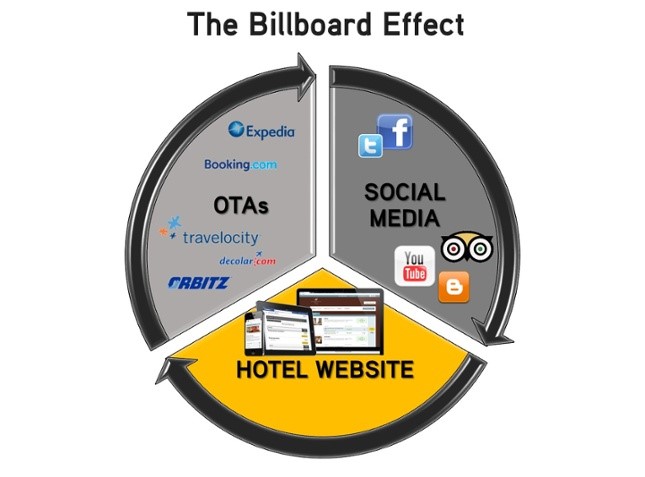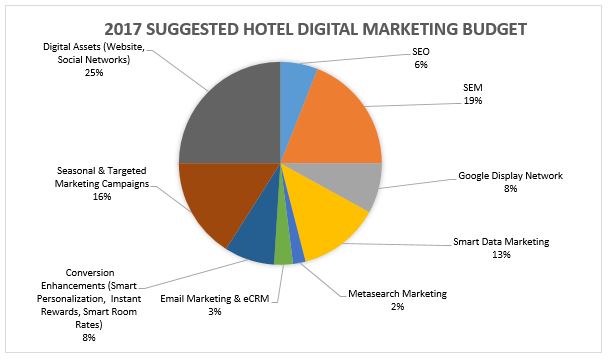Leading hotel chains are putting much effort into competing with what Morgan Stanley has dubbed their “frenemies” – the Online Travel Agencies (or OTAs). OTAs claim between 10-20% commission on bookings, and according to hotel marketing experts, WIHP, are the source of 76% of online bookings.
The efforts made by these brand name chains have included widespread marketing tactics such as Hilton’s “Stop Clicking Around” campaign and negotiations with OTAs to lower commissions on bookings. These hotels offer discounts to their rewards members as well as additional bonuses when customers book direct. Most importantly, these chains have invested in the necessary infrastructure to compete with the advanced OTA websites and search engine optimization efforts.
What can smaller hotels do?
Smaller, independent hotels, with their limited resources, can significantly improve profitability by increasing direct bookings to their hotels, as well. Each direct booking saves the commission paid to OTAs and creates a direct relationship between the customer and hotel, for future marketing efforts towards referrals and return visits. With fierce competition, the need for an effective marketing plan that will facilitate direct bookings is clear.
As over 90% of hotel bookings involve going online, whether solely to research hotels and prices, or to complete reservations, it is not surprising that experts, such as HeBS Digital, recommend that three quarters of a hotel’s marketing budget be allocated to digital marketing channels and strategies. With the recommended marketing budget for a hotel weighing in at 4-6% of total annual room revenues, at a minimum, hotels need to assure that they are investing their budgets effectively.
We have analyzed this marketing mix and come up with recommended expenditures for 2017 hotel marketing budgets.
Responsive website design extends your reach
With heavyweights such as leading OTAs and hotel chains to compete with, it is crucial that today’s hotels have advanced, user-friendly websites that include high quality pictures that attractively depict the hotel, details regarding amenities, and a list of nearby attractions. As shown above, nearly all travelers go online as part of the booking process, with 52% of OTA visitors going onto the hotel’s website before booking, according to WIHP.
The OTAs serve as a billboard for hotels, with 20% of a hotel’s direct bookings originating from OTAs. As there is never a second chance to make a good first impression, the hotel website design and messages must present and represent the hotel well, in terms of look and feel, simple navigation, depth of content and ease of booking and paying. By converting visitors before they move on or back to OTAs, independent hotels can increase their direct bookings and profits.
Image source: Frontdesk Anywhere
In its 2017 report, HeBS recommends investing 25% of the hotel’s digital marketing budget in website and social media optimization. Of this, website redesign and content management systems should account for 9% of the total marketing budget with investments in website optimization consulting an additional 8% of the total budget.
Hosting, analytics and social media optimization should make up 4% of the total budget, and investments in website technologies such as smart booking and “what’s nearby” an additional 4%. By consistently optimizing their websites, hotels ensure that they are offering the same cutting-edge capabilities as leading OTA and hotel chain websites.
eMarketer projects that by 2019 approximately 70% of digital travelers will reserve hotels via a mobile device, which is up from just 43.8% in 2015. Considering this, hotel websites need to be responsive, catering to desktop, mobile and tablet based visitors. Booking should be uncomplicated, with as few steps as possible, and payments should be possible via an online payment platforms offering a wide range of options, including the increasingly popular mobile wallet and mobile money options.
Digital marketing campaigns should make up the lion’s share of your budget
HeBS has recommended allocating 59% of the hotel’s digital marketing budget on direct response digital marketing campaigns. HeBS breaks these initiatives down as follows:
- Search Engine Marketing (SEM) includes paid search on search engines, as well as Google and YouTube ads. A full 19% of the budget should be allocated to SEM activities
- Search Engine Optimization (SEO) should receive 6% of the budget. With the race to appear high in search engine results, it is important to invest in updated, changing and unique content, on a regular basis.
- Google Display Network (GDN) is a passive advertising mechanism, displaying content specific ads to potential customers on millions of websites in Google’s network. This advertising strategy reaches over 90% of people online. 8% of the marketing budget should be invested in this channel.
- Smart Data Marketing includes CRM analysis of customers and target audiences as well as dynamic rate marketing, in which potential customers are fully appraised of the different room rates, based on date and room types. These marketing efforts should make up 13% of the marketing budget.
- Email marketing and eCRM efforts should represent 3% of the budget.
- Metasearch marketing, which provides real time data on prices and availability, should represent 2% of the budget.
- Website conversion enhancements, which include various strategies for converting a website visitor to a customer, should receive at least 8% of the marketing budget. These efforts include reservation abandonment applications, such as automated emails when a visitor does not complete a booking, or a lightbox display ad encouraging the visitor to comeback, possibly with an added incentive included. Other enhancements include dynamically personalized content based on demographics, location or other data on the visitor, as well as instant reward programs and smart room rates.
While the above presents the recommended breakdown of a digital marketing campaign, consistent monitoring is required to ensure that these efforts are creating the desired result. The advantage of digital marketing is its flexibility, which allows simple budget shifts that can be analyzed for continual optimization.
Below is a summary of the digital marketing budget components and allocation suggestions according to the HeBS 2017 report:
Boost marketing results by targeting your customers
As with any business, it is important to know who your target audience is. Use your CRM tools to define your customer’s characteristics and build their profile. Are your customers business executives? Couples on a romantic getaway? Families? What are their interests during their stays? Build their financial profiles as well, in order to adjust prices accordingly. Adjust your amenities and services to meet their specific needs, and create special offers and deals for your target audience.
HeBS suggests allocating 16% of the digital marketing budget towards seasonal and targeted marketing campaigns. Use analytics available to you locate where your target audience can be found. Where do their searches and clicks originate? Are they responding to Facebook ads? Instagram? Do they link through to your websites on OTA sites or review boards such as TripAdvisor? Once you have located your audience, remember to expand to other channels, thereby increasing your reach and ultimately your customer base and bookings.
Remember to reply to all comments by previous customers on review sites, whether to thank a guest, or respond to complaint, as these are leading places your audience is likely to visit. In its 2014 study, 77% of travelers always or usually checked TripAdvisor before completing a booking.
To sum it all up, pay attention to industry trends, be sure to define your target market, and analyze your customer base to update your marketing mix and target your marketing efforts accordingly. Focus the majority of your marketing efforts on digital marketing, making sure to offer a responsive and easy to navigate website, as well as additional marketing strategies to turn visitors into direct bookings.


